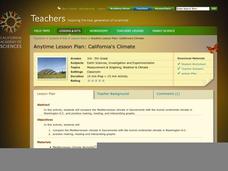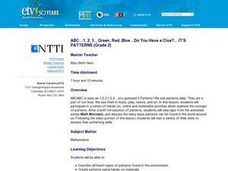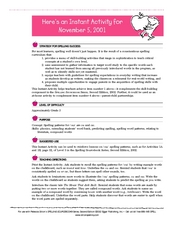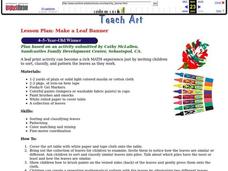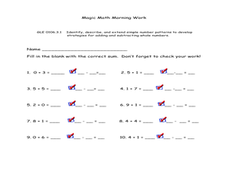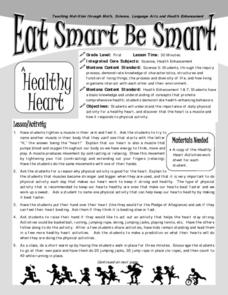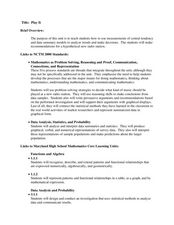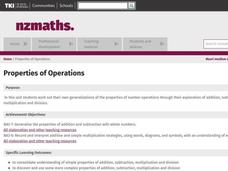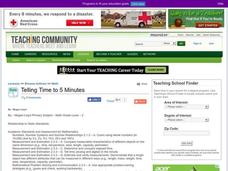West Contra Costa Unified School District
Fractional Exponents and Property of Exponents
Don't just use a fraction of this resource ... use it all. Learners first investigate patterns to determine how to deal with fractional exponents. Individuals then evaluate expressions involving fractional exponents.
EngageNY
Multiplication of Numbers in Exponential Form
Develop a solid understanding of multiplication and division properties of exponents. Individuals expand exponential terms to discover the patterns and create the properties in the second installment in a series of 15. The activity...
California Academy of Science
California's Climate
The United States is a large country with many different climates. Graph and analyze temperature and rainfall data for Sacramento and Washington DC as you teach your class about the characteristics of Mediterranean climates. Discuss the...
Science Matters
Seismic Activity and California Landforms
By the 19th instructional activity in the 20-part series, scholars realize volcanoes and earthquakes are related to plate boundaries. The instructional activity extends and applies the knowledge by having individuals create a bumper...
Curated OER
ABC...1, 2, 3...Green, Red, Blue...Do You Have a Clue?... IT'S PATTERNS
Second graders view clips from the animated series Math Monsters, and discuss the many ways patterns can be found in the world around us. Following the video portion of the lesson, 2nd graders visit a variety of Web sites to assess their...
Curated OER
Here's an Instant Activity for November 5, 2001
Third graders practice spelling ou words. In this phonics and spelling lesson, 3rd graders brainstorm words using the 'ou' spelling pattern. Students review compound words and brainstorm compounds words. Students complete the 'instant...
Curated OER
Patterns of Settlement in Early Alabama
Fourth graders study the settlement of Alabama. They collect data from the U.S. census website and answer questions regarding settlement patterns in the counties of Alabama in 1820. They write a paagraph describing where they would have...
Curated OER
Make a Leaf Banner
Students create an leaf print banner, and classify, sort and find patterns in the leaves as they work.
Curated OER
Magic Math Morning Work
In this fact families activity, students solve 10 problems in which single digits are added with sums to ten. Students then check each problem using subtraction.
Montana Office of Public Instruction
Eat Smart Be Smart
Get children's blood pumping with this primary grade lesson on the human heart. After learning about the important role this muscle plays in the human body, students monitor their heart rates and discover the importance of staying active.
Curated OER
Play It
There are a number of activities here that look at representing data in different ways. One activity, has young data analysts conduct a class survey regarding a new radio station, summarize a data set, and use central tendencies to...
Curated OER
Investigation - Mathematical Reasoning: Tables and Chairs
Fourth graders draw pictures and diagrams as they attempt to solve a mathematical problem involving the arrangement of eleven tables shaped like equilateral triangles and the seating of exactly twenty-five people.
New Zealand Ministry of Education
Properties of Operations
Learners consolidate and extend understanding of simple properties of the four arithmetic operations. They use these properties as an aid to easy calculation. They discover and use some more complex properties of addition, subtraction,...
Curated OER
Calculator Pattern Puzzles
Students explore number patterns and relationships while being introduced to the calculator at the same time.
Curated OER
Let Us Be Sensible
Learners describe the five senses. They perform an investigation using sensory organs associated with each of the senses. Students identify, describe and extend repeating relationship (pattern) found in common, objects, sounds and...
Curated OER
Social Studies: Personal Chronology
Fourth graders draw ten significant events from their lives on index cards, shuffle them, and trade sets with other students. Their classmates try to place them in chronological order. Next, 4th graders tape their index cards next to...
Curated OER
Investigation - Looking For Triangles
Seventh graders investigate a series of triangles, looking for patterns and generalizing what they have found. They analyze the pattern data and organize it into a table and graph. Students identify the relationship and discover the rule...
Curated OER
Line Symmetry and Rotational Symmetry
Fifth graders investigate the symmetry of pattern block shapes. Students, working in groups determine whether each shape has line symmetry, rotational symmetry or both kinds of symmetry. Students determine how many lines of symmetry the...
Curated OER
Telling Time to 5 Minutes
In this second grade lesson your class will practice telling time. The goal is to tell time to five minutes using an analog clock. Your young students count by 5 minute intervals and discuss elapsed time.
Curated OER
Investigation Area of Geometric Shapes
Fourth graders use triangle paper to design patterns using geometric figures and find the areas of those figures by counting units. Students are assessed by determining which figure has the greatest area and explaining their reasoning.
Curated OER
Investigation-Reasoning and Proof
The class explores even and odd numbers.They discuss the results when even numbers are added and when odd numbers are added together. Then work in pairs to find other odd and even pattern examples.
Curated OER
Investigation- I've Got It
Students practice grouping skills by sorting footwear of the class as a whole group. Activity can be extended by having individual students sort a variety of colored items using a sorting mat.
Curated OER
Composite Functions and Inverse Functions
In this function worksheet, students complete five lessons all with exercise sets, examples, and definitions, and one set of miscellaneous exercises. The concepts covers include: composite functions, inverse functions, graphs of...
Curated OER
Graphing Linear Functions
Seventh graders identify the use of a function.They are asked to describe the input and output of a function. Students also identify different aspects of the coordinate system and represent functions in a visual graph.




